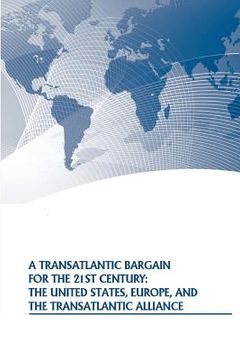A Transatlantic Bargain for the 21st Century: The United States, Europe, and the Transatlantic Alliance (en Inglés)
Reseña del libro "A Transatlantic Bargain for the 21st Century: The United States, Europe, and the Transatlantic Alliance (en Inglés)"
The same may be said of the transatlantic bargain that has underpinned the North Atlantic Treaty Organization (NATO) since its founding and framed the relationship between the United States and its European allies. A source of both enduring stability as well as perpetual discord, the transatlantic bargain has always been a balancing act between a U.S. commitment to European security in return for a position of U.S. leadership and dominance of NATO, and the expectation that Europeans would accelerate efforts to provide for their own defense. Such a balance remains the essence of the bargain in the 21st century, but the context within which the bargain must operate has changed dramatically, and the nature of America's relationship with the Alliance is perhaps under more scrutiny than ever before.In the context of the contemporary security environment- one characterized by the complexity of modern operations requiring a range of civilian and military capabilities, and a changing world characterized by the diffusion of power and the rise of China-the Atlantic Alliance, as well as the transatlantic bargain that underpins it, must reorient itself to its changing landscape. The combined experiences of NATO's missions in the Balkans, a decade-long expeditionary operation in Afghanistan, and its most recent mission in Libya, coupled with a climate of fiscal austerity on both sides of the Atlantic, have placed the bargain under immense strain. During the first Barack Obama administration, it became evident that Washington is increasingly less willing to tolerate what it sees as fundamental gaps within the Alliance-in defense spending, capabilities, and military transformation. As a result, Washington is signaling more forcefully than ever to its European allies, as well as NATO partners, that they must take on a greater share of Alliance burdens, accelerate efforts to generate capabilities and resources, and move away from a deeply entrenched culture of dependency.Revising the bargain requires new ways of thinking, both in the United States and Europe. There are signs, however, that not only is there a consensus on the need to revise the transatlantic bargain, but that the outlines of what such a bargain might look like are beginning to emerge. U.S. rebalancing toward the Asia-Pacific and a reduction in U.S. forces in Europe in no way signal a turning away from Europe, only recognition that the United States inhabits a changing world; this is a process that essentially has been under way since the end of the Cold War, but has been accelerated in the context of the challenges and demands of a decade of war, a climate of austerity, and the rise of new centers of power. U.S. political and military leaders should continue to affirm NATO's enduring importance and value for America. The United States has already begun to signal a shift in mindset; the U.S. military is reconfiguring its force posture to reflect the wider strategic rebalancing to the Asia-Pacific, but to offset European fears over a reduced U.S. commitment to Europe, the U.S. military should, and will, continue to support regular rotational deployments to conduct joint training with its European allies and ensure both sides are able to operate together on future missions. The U.S. Army in Europe (USAREUR) will continue to play a role-albeit reduced in size-in building partner capacity and fostering interoperability through ongoing training and exercises with European allies. Continuing multinational Landpower exercises of the kind currently undertaken by USAREUR will be another valuable tool in demonstrating the U.S. military's ongoing commitment to capacity building and partnership in Europe.

